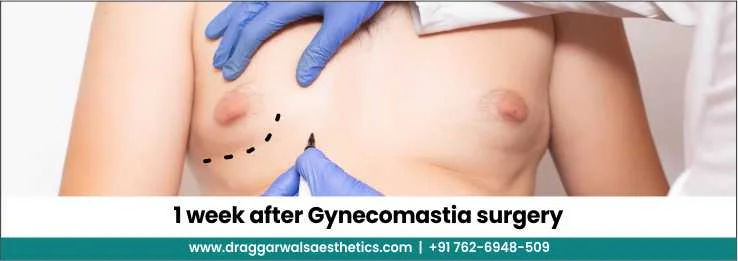If you are a man who has developed enlarged breast tissue, then this condition is known as gynecomastia. There are multiple reasons why you can suffer from this condition, like hormonal changes in your body, weight gain, certain medications, or genetics.
Now, even though it is not a life-threatening condition, you may feel embarrassed or uncomfortable because of it. This is why some people choose to have gynecomastia surgery to get rid of the extra tissue and improve their chest shape.
So, if you have also recently had this surgery or are planning to have it soon, you might be wondering what happens after the operation. Hence, in this blog, we will explain everything you need to know about the first week after gynecomastia surgery. It will include how to take care of yourself, what to expect during recovery as well as tips that will help you to heal faster.
What is Gynecomastia Surgery?
Before we begin to talk about recovery, let us first understand what happens in the surgery.
Gynecomastia surgery is also known as male breast reduction surgery. It is performed by a plastic surgeon who removes the extra fat and gland tissue from your chest. There are also many cases in which liposuction is used to remove fat. In addition, some surgeries involve minor cuts that are made to remove the glandular tissue directly. There are also some cases in which both these techniques are used.
Typically, this surgery takes around 1-2 hours, and most people are allowed to go home on the same day. You are also given medicine to help with the pain and swelling that occurs after the procedure.
The First 24-48 Hours After Surgery
Generally, you will feel the most uncomfortable in the first two days after your surgery. So, here’s what happens during this time-
Pain and Discomfort
There will be a feeling of soreness and tightness in your chest area. It can almost feel like you have done a very hard chest workout. This is usually managed by the painkillers that your doctors will prescribe to you.
Swelling and Bruising
Another normal condition is swelling. Your chest can look bigger than before the surgery. However, there is nothing to worry about as it is temporary. You may also notice some bruising that could last for a few days.
Dressings and Compression Garments
Your surgeon will cover the cuts with bandages and you will also be asked to wear a compression garment. This vest will help to keep a check on the swelling and support your chest as well while it heals. You are required to wear it 24/7 except while bathing.
Day-by-Day Recovery: What Happens in the First Week
Here is a breakdown of what you might experience during the first seven days. After gynecomastia surgery-
Day 1: Surgery Day
- It is common for you to feel drowsy or tired.
- There will be bandages and a compression garment over your chest.
- You will have to take complete rest.
- You will need someone to help you at home, especially with your meals and going to the bathroom.
Day 2-3:
- The pain will still be there. However, it can be a little less due to the medicines.
- There will be swelling and bruising but both can be managed.
- You may also feel a tightness in your chest.
- It is recommended that you take a little walk inside your house to help the blood flow better.
Day 4-5:
- You will notice that your soreness has begun to go down.
- Now, you will be able to move more freely.
- During this time, you will feel itchy as your cuts begin to heal.
- You may also feel well enough to do light tasks.
Day 6-7:
- Your swelling and bruising will reduce slightly.
- The stitches can also be removed during this time if they are non-dissolvable.
- You may visit your doctor for a follow-up.
- However, you may still have to wear your compression garment.
What to Do During the First Week?
If you want to undergo a smooth and efficient recovery, then make sure to follow your surgeon’s advice strictly. So, here are some important things to do in the first week-
Wear Your Compression Garment
Your compression garment will help to reduce the swelling and also improve the final shape of your chest. Hence, you must wear it exactly like your doctor says. Generally, it has to be worn for three to six weeks but the first week is the most important.
Take Prescribed Medicine
The medicines that will be given by your surgeon are mainly for pain relief, reduction of swelling, and prevention of infection. So, you must not skip any doses as they will help you to recover better.
Get Enough Rest
Do your best to avoid any kind of heavy tasks. Let your body rest so that it can heal properly. Try to take short walks inside your home as it will help to avoid any clot formation. However, do not do anything that can strain your chest.
Keep the Area Clean
Firstly, do not touch or scratch your cuts. So, follow your doctor’s advice about showering or cleaning the area. Generally, you can take a gentle shower after 2-3 days but it mainly depends on your surgeon.
Eat Healthy Foods
Good nutrition will help your body to heal faster. So, eat fruits, vegetables, and protein-rich foods and also drink a lot of water.
Tips for Faster Healing
Want to recover smoothly and get great results? Well, here are some simple tips that will help you achieve just that-
- Most importantly, follow all the post-surgery instructions carefully.
- It is also important for you to avoid smoking or drinking alcohol. It is because both of these slow down your healing process.
- Do not miss your medicines or follow-up visits.
- Keep a healthy lifestyle by eating well and getting proper sleep. Also, stay hydrated.
- Avoid direct sun exposure on your chest, especially if you have scars.
Conclusion
The first week of gynecomastia surgery should be all about rest, proper care, and also following your surgeon’s advice. Now, it is natural for you to feel uncomfortable in the beginning but things will get better each day. Some people also feel anxious but this is very normal. You may also feel disappointed too soon thinking that your surgery has not worked. But you need to remember that true results take time.
Besides, if you have any questions or concerns during recovery, you should always reach out to your surgeon. They are the best person to guide you through the healing journey.












Leave a Reply
Want to join the discussion?Feel free to contribute!